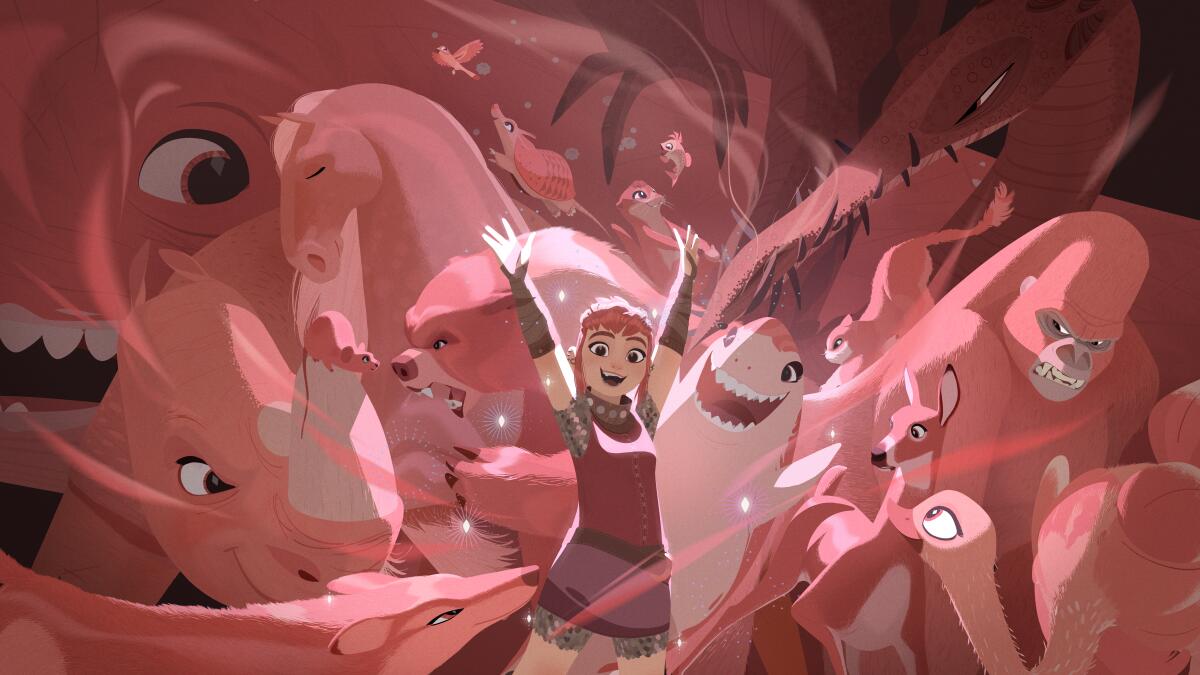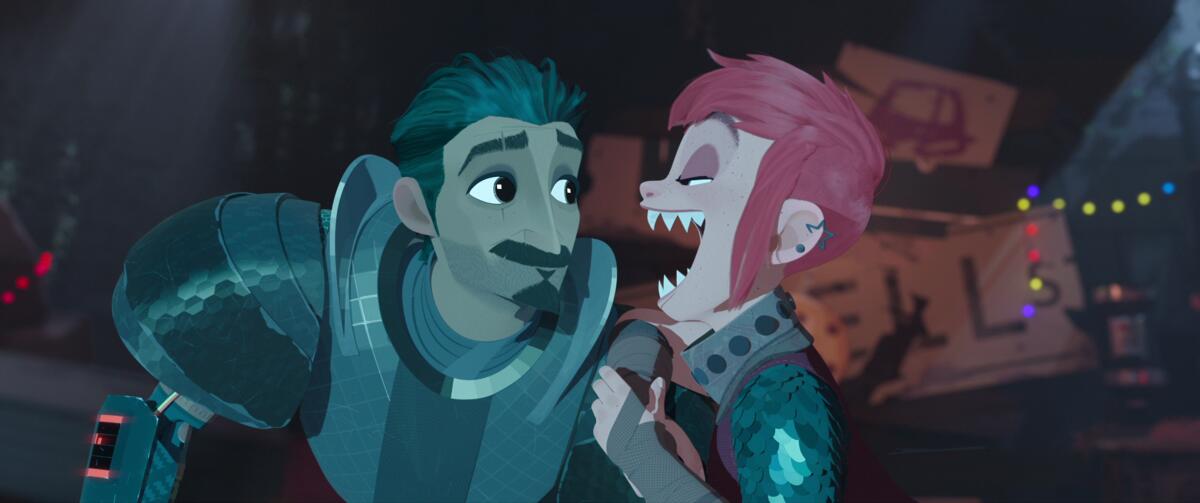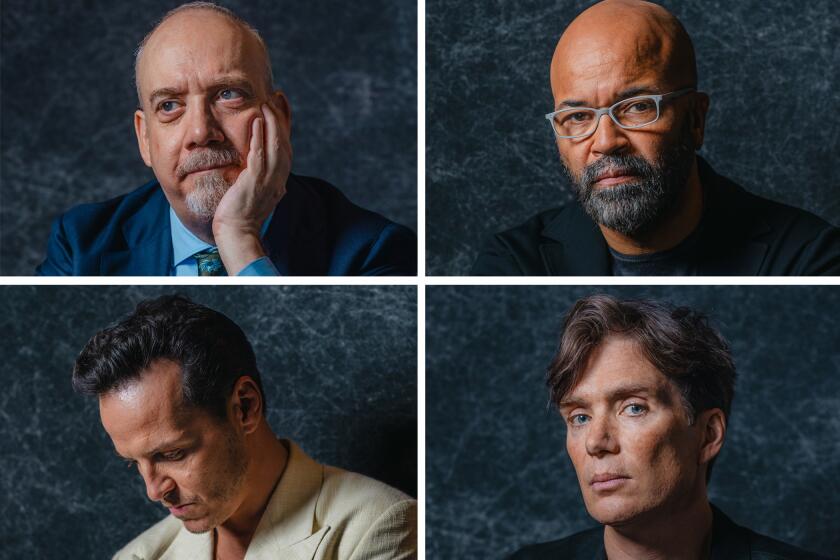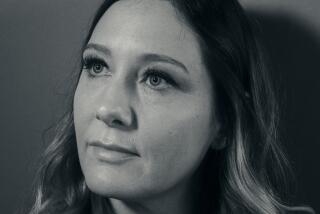How the animated ‘Nimona’ broke LGBTQ+ barriers and survived to tell the tale

Netflix’s animated “Nimona” is beautifully rendered, often hilarious, imaginatively set in a world straddling the Middle Ages and a sci-fi future, and powered by one of the year’s more memorable vocal performances (Chloë Grace Moretz as the titular heroine). In it, a weird little punky girl with the power to assume any form comes to a formidable warrior (voiced by Riz Ahmed) on the verge of knighthood before being framed for killing the queen. Nimona wants to help him become a great supervillain, when he’s really a hero searching for the real killer.
But those are just the outer layers of the onion.
“ ‘Nimona’ came out of a rough time,” says ND Stevenson, the award-winning cartoonist behind the shape-shifter. “I was a young adult. I was on my own in a way I wasn’t quite ready to be and I was looking for my place in the world. Things didn’t look great at that time. [Nimona] came out of that emotional turbulence, because there were all these feelings and I didn’t know where else to put them.
“I just knew what my discomfort was around being seen as a girl. So this character was kind of a way of trying to feel more powerful in that [female] form.”
Our BuzzMeter film experts are back to predict what Oscar voters will nominate in 10 Academy Awards categories. Vote in the online polls!
Stevenson doodled the character, then called Nightshade, in high school, then fleshed her out in college: The shape-shifting, gleefully murderous outcast just wouldn’t go away. She appeared in a popular webcomic, which then became a bestselling graphic novel and, perhaps fittingly, after many changes, now a Netflix/Annapurna animated feature. But what about this strange, violent creature wouldn’t leave Stevenson alone?
“I was really uncomfortable in my own skin,” he says of not yet being out as transmasculine, even to himself. “I was navigating the world in a body that didn’t feel like my own. So this character was an attempt at reclaiming that. It was really important she had the body shape she does. At the same time, she didn’t have to stay in that body, she could be anybody, she could be anything. That was this huge power fantasy for me, it still is the superpower I would choose.

“That would become a lot more obvious, what that was about, years later, when I came out as trans. But at the time, I was nowhere near ready to look that in the eye.”
That metaphor of the outcast changeling, rejected for who she is at her core by a rigid society, earned a loyal following — and accolades, including an Eisner Award and a National Book Award nomination.
Then Hollywood came calling.
For years, an animated adaptation was in the works at 20th Century Fox Animation subsidiary Blue Sky Studios ... until it wasn’t. Speculation that the film’s LGBTQ+ elements became an issue after Disney’s acquisition of Fox was founded in reality, say eventual directors Nick Bruno and Troy Quane.
“The struggle was real,” says Quane of running into the high wall of expectations that come with making a major-studio animated feature. “ ‘Can we have a gay love relationship in this movie?’ The reality is, there was a lot of nervousness. There was pushback. There was a point where the movie was dead. Disney shut down the studio.”
Inside the fight to keep ‘Nimona’ alive so the adaptation of ND Stevenson’s acclaimed graphic novel could make it to a screen near you.
Bruno and Quane had previously been more delicate about the studio’s issues with the film. Not anymore.
“We put together [reels] that we were all incredibly proud of, and we went to screen it for our Disney bosses,” says Bruno, explaining that the filmmakers expected a standard notes session. Instead, “The first words out of their mouths were, ‘Let’s talk about the gay thing.’ ”
To be certain, “Nimona” is not a Pride parade on film; it’s a buddy action comedy. Apart from the central metaphor, its LGBTQ+-ness is expressed in brief, chaste moments of closeness between the two main male characters. But that proved too much for some.
“It was profoundly sad and I feel bad even mentioning it in front of [Stevenson] because that kind of bull— shouldn’t happen,” says Bruno. “A place like Disney is the hallmark of the world. They put it out there, people believe in it. They’re just as much a religion as anything else.”
Quane says they shopped the movie around until Annapurna‘s Megan Ellison told them, “It’s crazy because I know you didn’t, but I feel like this movie was literally written for me.” It was finally completed and ended up on Netflix, where it has earned a 94%-positive rating on Rotten Tomatoes.
“Looking back, I see that cry for help, that plea to be seen and understood,” says Stevenson, who consulted on the film’s script. “I had the distinct and uncomfortable, and yet ultimately really rewarding, experience of watching this movie with my parents. I was aware of things I maybe never even said to them, being said through this character and this movie. And I got to see my parents cry. After the movie was over, we had a conversation we had never had before.”
With fondness, Bruno cites the commitment of those working on the film at Blue Sky and beyond: “We were doing something that everyone in that studio believed in doing. [It’s] why we all got into this business in the first place: Tell better stories to help our younger selves, because we needed it.”
More to Read
From the Oscars to the Emmys.
Get the Envelope newsletter for exclusive awards season coverage, behind-the-scenes stories from the Envelope podcast and columnist Glenn Whipp’s must-read analysis.
You may occasionally receive promotional content from the Los Angeles Times.









